Domingo Alcaraz-SeguraUniversity of Virginia, USda6f@virginia.edu 
Domingo Alcaraz-Segura is a PhD in Environmental Sciences (Universidad de Almería). His research focuses on the functioning and biodiversity of ecosystems, monitoring of protected areas and the impacts of land-use/land-cover changes on them using remote sensing and GIS. At present he is a postdoctoral fellow at the Environmental Sciences Department of the University of Virginia studying ecosystem functioning and the effects of land-use change in the Rio de la Plata Basin (Parana and Uruguay rivers). |
Roxana AragónGrupo de Estudios Ambientales - Instituto de Matemática Aplicada San Luisaragon@agro.uba.ar 
Roxana Aragón is a graduate student working in "Grupo de Estudios Ambientales" at the Universidad de San Luis in Argentina. She got a degree in Biological Science in 1997 from University of Tucumán, Argentina, and a Master Degree in 1999 from the Zoology Dept. at North Carolina State University, NC, US. She is PhD at the Dept. of Agronomy at the University of Buenos Aires, Argentina. Her PhD thesis explores the relationship between landscape heterogeneity and temporal variation in ecosystem function. Roxana is now working in a project that aims to understand the interactions and potential feedbacks between climate, land use changes and groundwater dynamics in temperate grasslands of the Pampa plains in Argentina. This project involves working at regional and local scales, and uses diverse tools such as remote sensing, temporal series analyses, and field sampling at plot scale. |
Germán BaldiGrupo de Estudios Ambientales - Instituto de Matemática Aplicada San Luisbaldi@ifeva.edu.ar 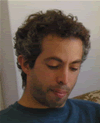
Germán Baldi is a graduate student working in "Grupo de Estudios Ambientales" in the Universidad de San Luis in Argentina. He got a degree in biological sciences in 2002 from the Universidad de Buenos Aires and a master degree on natural resources at the Faculty of Agronomy at the same University. His work involves the characterization of land use changes, and the exploration of direct and indirect causes of those patterns. He basically uses remote sensing information combined with different data bases. He is also developing a web-site that seeks to build up a forum and a dynamic library about "hot spots" of ecosystem functional changes over the past 25 years in South America.
|
Silvina I. BallesterosGrupo de Estudios Ambientales - Instituto de Matemática Aplicada San Luissballest@unsl.edu.ar 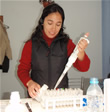
Silvina Ballesteros is a graduate student working at "Grupo de Estudios Ambientales" in the University of San Luis in Argentina. She obtained her degree in Agronomy in 2005 from University de Entre Ríos (Argentina). One of her main contribution to this project has been the development, programming and updating of the website. Additionally, she is in charge of chemical and physical analysis of soil, vegetation and water samples. She plans to start a master degree on natural resources at Facultad de Agronomía – Universidad de Buenos Aires). Silvina’s project involves understanding soil and groundwater chemical changes triggered by the establishment of tree plantations in grasslands. Her field work includes soil and ground water sampling in paired eucalyptus plantations and native grasslands for chemical analysis (Cl, Na, Mg, Ca, K, pH, electrical conductivity, among others). |
Federico BertCátedra de Cereales, Facultad de Agronomía, UBA. AACREA.fbert@agro.uba.ar Federico Bert is an agronomist (UBA) and currently is completing his PhD (Universidad de Buenos Aires). His research is aimed to understand and modeling the scope for adaptive management in response to interannual and long term climate variability in agroecosystems. Federico’s interests also include use of novel information and technologies to enhance outcomes of agroecosystems. Federico is member of the Cátedra de Cereales, of the Facultad de Agronomía (UBA) and the technological area of AACREA (Asociación Argentina de Consorcios Regionales de experimentación Agrícola). Federico has a PhD scholarship from CONICET (Argentina’s Science Research Council). |
Sergio CalderonGrupo de Estudios Ambientales - Instituto de Matemática Aplicada San Luis.sergiocalderon23@gmail.com 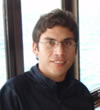
Sergio is an undergraduate Electronic Engineer student at the Universidad de San Luis developing his thesis on control and artificial vision. He is a member of the Electronic Devices and Software Development Team for specific environmental applications for GEA. Currently Sergio contributes to the development and implementation of VegNap, a model which simulates the interaction between evapotranspiration and water table depth in ecosystems. |
Matias CarambulaDepartment of Social Sciences, School of Agronomy, University of the Republic, Uruguay.mcarambula@fagro.edu.uy Agronomist and Magister in Agricultural Sciences with mention in Social Sciences, University of the Republic, Uruguay (2004/2006). Doctoral student in Agricultural Social Studies at National University of Cordoba, Argentina (2006/2010). Assistant Professor in Rural Sociology, University of the Republic, Uruguay. Research focused on the transformations of the rural employment market generated by global changes. The interaction of agricultural public policy and different global change scenarios is explored in his doctoral thesis. |
Lorena V. CarreñoINTA - Centro Regional La Pampa-San Luis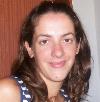
Degree in Natural Resources and Environment (University of La Pampa). Main research field: ecology of agricultural systems. Investigations are mainly focused on the effects of land-use changes on the provision of ecological services and watersheds management. L.V. Carreño has had a FONCyT (Science and Technology Fund, Argentina) initial research scholarship from May of 2005 to January of 2007. Project title: "Agro-ecological impact of one century of agriculture at two geographical scales in the Argentine Pampas". L.V. Carreño is also a Doctoral Degree Candidate. |
Darío S. CeballosINTA, EEA Delta Paranádceballos@correo.inta.gov.ar 
Darío Ceballos is an agronomist and he is doing your magíster in natural resources at the Faculty of Agronomy (University de Buenos Aires). His research are oriented to the loss of nutrients like product of land use change in wetlands of Delta of Paraná River. Approaches involve field experiments and observations. At the moment this in the equipment of natural resources of inta delta. |
Constanza CarideIFEVA, Facultad de Agronomía, Universidad de Buenos Aires - INTA - Instituto de Clima y Aguaccaride@agro.uba.ar 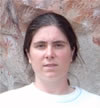
Constanza Caride obtained her B.Sc. Agronomist degree at Buenos Aires University (UBA) in 2002. In 2003 she joined the LART laboratory (IFEVA), where she worked until 2005 as an image processing technician and Agronomist assistant. She is currently a Ph.D student founded by CONICET (Argentina's Science Research Council) and *ad honorem* teacher of pre-graduate students in the Department of Natural Resouses at Agronomy College, UBA. Her research focuses on: the use of remote sensing to characterize and monitoring land use/land cover and the impact of land use change on ecosystem functioning/services. Her Ph.D thesis aims to analyse and cuantify, at regional scale, crop secuences, tillage practices, evapotranspiration, C balance and greenhouse gas emissions, using tools such as remote sensing, data bases, simulation models and field sampling. |
Sergio Contreras LopezGrupo de Estudios Ambientales - Instituto de Matemática Aplicada San Luissergio@eeza.csic.es 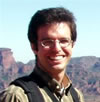
Sergio got his bachelor degree in Environmental Sciences (2001) and his PhD in ecohydrology (2006) at the University of Almeria (Spain). He worked for five years at the Research Station of Arid Zones belonging to the Spanish National Research Council (CSIC) and actually he enjoys a postdoc position at the Grupo de Estudios Ambientales (UNSL-CONICET). Sergio is especially interested in the role that groundwater plays on the maintaining and functioning of natural and agricultural dryland ecosystems. In the framework of this project, he is developing a coupled groundwater-vegetation model (VegNap) to simulate the impacts and feedback processes that water table dynamics have on the productivity of those ecosystems. |
María de los Ángeles FischerINTA - Instituto de Clima y Aguaafischer@cnia.inta.gov.ar 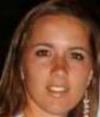
María de los Ángeles Fischer is an Agronomy Engineer and completed her education at the University of Moron. She joined the National Institute of Agricultural Tecnology (INTA) with a post-graduated scholarship granted by Carlos Di Bella, coordinator of PICTO project: "NINA: An operational tool to evaluate, prevent and monitor fires using remote sensing data". This project was financed by INTA and SECYT. Her master thesis is based on "The vegetation's conditions that influence the occurrence, propagation and duration of fires in the Semiarid Region of Argentina" . |
Federico C. FrankINTA - Centro Regional La Pampa-San Luis
Degree in Natural Resources and Environment (University of La Pampa), MSc. (University of Mar del Plata, Argentina). Main research field: ecology of agricultural systems. Investigations are focused on the effect of land use, agricultural practices and technology on the functioning of agro-ecosystems, at different spatial and temporal scales. F. Frank has an INTA (National Institute of Agricultural Technology, Argentina) research scholarship since 2004, and teaches at the Faculty of Natural Sciences in the University of La Pampa. He has taken part in several research programs ( Biogeochemical cycles under landuse changes in the semiarid Americas - IAI, Caldenal Project and Ecocertification National Program - INTA, Linking the World's Grasslands - Kaplan Fund ) and participates in INTA's National Programs about environmental impact, land use management and ecosystem services. He has dictated two courses on Evaluation of Environmental Performance Methods for PROCISUR (in Uruguay and Chile), and also co-authored three publications, one book chapter and several communications. He is now a PhD candidate. |
Juan Pablo GuerschmanCSIRO Land and Water Environmental Sensing, Prediction and ReportingCanberra, Australia Juan.Guerschman@csiro.au 
Juan Pablo Guerschman obtained his PhD in Agricultural Science in the Faculty of Agronomy at the University of Buenos Aires, Argentina. His career began with a degree in Agronomy at the same institution. He is currently a Posdoctoral Fellow with the Remote Sensing group at CSIRO Land & Water, in Canberra, Australia. Juan Pablo's recent work and interests include land use/land cover change, biogeochemistry and modelling. He is currently involved in a NASA-funded project aimed at improving the understanding of the carbon and water dynamics in tropical savannas through the use of model-data assimilation and remote sensing tools |
John KimDepartament of Ecology - Duke Universityjohn.kim@duke.edu 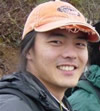
John Kim is a graduate student in Duke University program of Ecology in North Carolina, USA. He received a Bachelor of Arts in Ecology and Evolutionary Biology in 2004 from Princeton University, USA. His PhD thesis explores changes in ecosystem services that can mitigate climate change and water shortage with land-use/cover changes. His project examines carbon storage and groundwater recharge under woody plant invasion and agricultural conversion of grasslnads. |
Nicolás A. MariINTA - Instituto de Clima y Aguanmari@cnia.inta.gov.ar 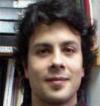
Nicolás A. Mari is graduated on Environmental Management working at the Instituto de Clima y Agua, INTA. His research is oriented on the characterization of post fire effects and temporal dynamics over different ecosystems types. At the present Nicolás is involved on the implementation of regional networks for the integration of latinoamerican experts on remote sensing and forest fires. |
Juan Pablo MartiniINTA EEA San Luis - Laboratorio de Geomática Aplicadajuampamartini@yahoo.com.ar 
Juan Pablo Martini is an Agronomist (2007), Universidad de La Pampa. He is starting a master degree in Agronomy founded by IAI. His work involves the use of remote sensing in the semiarid regions in Argentina. |
Arturo Emiliano MelchioriINTA - Instituto de Clima y Aguaamelchiori@cnia.inta.gov.ar Arturo Emiliano Melchiori got his Bioengineer degree at the Universidad Nacional de Entre Rios (U.N.E.R.) on December 2003. His main contribution to this project is large fire data processing and software development in this particular field of interest. |
Mayra MilkovicLART - Laboratorio de Análsis Regional y Teledetección.milkovic@agro.uba.ar 
Mayra Milkovic is a graduate student working in "Laboratorio de Análisis Regional" in the Universidad de Buenos Aires in Argentina. She got a degree in Biological Sciences in 2005 from the Universidad de Buenos Aires. She is starting a master degree on natural resources at the Faculty of Agronomy at the same University. Her work involves the exploration of land use change impacts on ecosystem functioning, specifically afforestation in grassland ecosystems. She basically uses remote sensing information combined with different data bases. |
Marcelo D. NosettoGrupo de Estudios Ambientales - Instituto de Matemática Aplicada San Luis.mnosetto@unsl.edu.ar 
Marcelo Nosetto is an Agronomist (Universidad de Entre Ríos) and a graduate student working in "Grupo de Estudios Ambientales" in the Universidad de San Luis in Argentina. His work involves the exploration of land use change impacts on ecosystem functioning, specifically afforestation in grassland ecosystems. He uses a combination of plot, catchments and remote sensing approaches to uncover the effects of this land-use shift on water, carbon and salts dynamics. He is participating in several projects related to land-use change and its effects on ecosystem and regional climate, which involve collaborations with researchers at Duke University, Hungary and Uruguay. |
Patricio OricchioINTA - Instituto de Clima y Aguaporicchio@cnia.inta.gov.ar 
Patricio Oricchio is staff researcher at the Instituto de Clima y Agua, INTA. He is in charged of the reception and processing of satellite data captured in the Institute (NOAA, GOES, MODIS). His interests are focused on climatic determinants of fire occurrence. |
Ivan V. PerinoGrupo de Estudios Ambientales - Instituto de Matemática Aplicada San Luisivanperino@hotmail.com 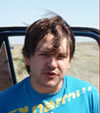
Ivan is an undergraduate Electronic Engineer student at the Universidad de San Luis developing his thesis on an embedded system which can be used in collecting water table properties, and additionally, developing software to aid in the analysis of the collected data. The project involves using of submersed electronic sensing devices to measure liquid pressure, temperature, and conductivity, with the objective of inferring water table levels and salinity. Ivan is a member of the Electronic Devices and Software Development Team for specific environmental applications for GEA. |
Gervasio PiñeiroIFEVA/CONICET. Catedra de Ecología, Facultad de Agronomía, UBA.pineiro@agro.uba.ar Personal webpage 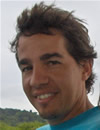
Gervasio Piñeiro is an Agricultural Engineering from the Universidad de la República, Uruguay and a PhD from the Universidad de Buenos Aires in Argentina. His research is now focused in understanding regional biogeochemistry in the Plata basin. Particular he is analyzing land use effects on biogeochemistry in afforestation, crop and livestock systems. Gervasio is an Assistant Researcher at IFEVA-FAUBA. |
Marisa PuenteGrupo de Estudios Ambientales - Instituto de Matemática Aplicada San Luismpuente@unsl.edu.ar 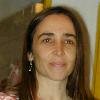
Marisa Puente is an Agronomist (1990), Universidad de Buenos Aires. Administrative Coordinator of GEA. Independent Professional, forestation consultant. |
Celina S. SantoniGrupo de Estudios Ambientales - Instituto de Matemática Aplicada San Luiscssanton@unsl.edu.ar 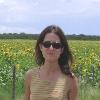
Celina Santoni is a graduate student working in "Grupo de Estudios Ambientales" at the Universidad de San Luis in Argentina. She got a degree in Biological Science in 2004 from Universidad de San Luis, Argentina. She is currently a Ph.D student founded by CONICET (Argentina's Science Research Council) and her work involves the exploration of land use change impacts on semiarid ecosystem functioning. She is studing the agriculture expansion in dry forests and the effects of this land-use shift on water and salts dynamics in semiarid regions in Argentina. This project involves working at regional and local scales, and uses diverse tools such as field sampling at plot scale, modelling and temporal series analyses. |
Carla V. RuedaGrupo de Estudios Ambientales - Instituto de Matemática Aplicada San Luiscrueda@unsl.edu.ar 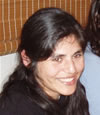
Carla Rueda is a graduate student in Ecology (Universidad de Santiago del Estero) and Ph.D student founded by CONICET (Argentinas Science Research Council) working in "Grupo de Estudios Ambientales" at Universidad de San Luis in Argentina. Her work involves the study of human appropriation of net primgbvary productivity in the Chaco Seco region, specifically the influence of forestry and livestock production systems on the energy flow. She uses a combination of remote sensing and census data to uncover the effects different production systems and social contexts on the energy flow (including harvest of timber, firewood). |
Diego F. SteinakerINTA San Luisdsteinaker@sanluis.inta.gov.ar 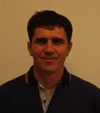
Diego Steinaker is Biologist (Universidad Nacional de Córdoba) and Ph.D. in Biology (University of Regina, Canada). His research focuses on plant ecology, and plant ecology applied to range management on semiarid grasslands, shrublands and forests. He is currently a researcher in the National Institute for Agricultural Technology (INTA) at the San Luis Experimental Station (Argentina). |
Julieta V. StraschnoyINTA - Instituto de Clima y Aguajulietaveronica2@yahoo.com.ar 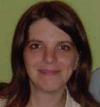
Julieta V. Straschnoy is an Environmental Management Bachelor and a master student on Environmental Studies. Her research is focused on the application of Remote Sensing and Gis tools to the analysis of fire occurrence and its relationships with natural and anthropogenic factors.
|
Andrés WehrleFacultad de Ingeniería, Universidad Nacional de Asunciónandreswema@gmail.com 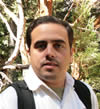
Andrés Wehrle is a graduate student working in "División de Recursos Hídricos" in the Universidad Nacional de Asunción in Paraguay. He got a degree in Civil Engineering in 2002 from the same University. He is currently a Ph.D student founded by IAI (CRN 2031). His work involves the characterization of land use pattern changes and their effect on the hydrological cycle. He focuses on river flow responses to agricultural expansion in watersheds of Paraguay, Brasil and Argentina that were originally occupied by Atlantic forest. |